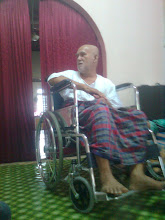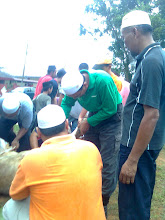
Ahli Pergerakan Islam An-Nahda sedang mengedarkan risalah kempen di hadapan Ibupejabat Parti itu di Ariana berdekatan Tunis. Semoga Allah beri kemenangan kepada mereka bagi mentadbir Tunisia dengan keadilan dan bebas rasuah.
Members of the An-Nahda Islamist movement distribute Tunisian election
leaflets in front of the party headquarters in Ariana near Tunis on 19 October.
Photograph: Fethi Belaid/AFP/Getty Images
Tunisian elections: the key parties
The first elections since the Arab spring take place on Sunday with a wide range of parties involved
Angelique Chrisafis in Tunis
guardian.co.uk
Wednesday 19 October 2011 18.22 BST
Tunisia goes to the polls on 23 October to choose an assembly that will rewrite the country's constitution. Nearly 11,000 candidates are to contest 218 seats.
After decades of despotism and one-party rule, about 110 political parties have sprung up and scores of independents are running. The key parties are:
An-Nahda (Renaissance)
Once outlawed and brutally repressed, with members imprisoned and tortured under the dictatorship of Zine al-Abidine Ben Ali in the 1990s, the Islamist party is now tipped to take the largest share of the vote in the election. Well-funded, with a large membership and strong grassroots support in the poorest areas, it is the best-organised political force in Tunisia.
Its founder, Rachid Ghannouchi, who was exiled in London for decades, describes the party as moderate, tolerant, pro-democracy and keen to protect Tunisian women's rights in a pluralist society. Pushing liberal and conservative policies, it has been likened to Turkey's Islamist-rooted ruling Justice and Development party (AKP).
Secular critics say the party is an unknown quantity and fear that, once elected, hardliners could seek to enforce a more fundamentalist Islam on Tunisia's secular, civil society. Secular feminists have warned there would be fierce opposition if the party ever sought to roll back women's rights in Tunisia, the most progressive in the Arab world.
The Progressive Democratic party (PDP)
Founded in 1983, the secular centre-right party was part of the legal, but oppressed, opposition during the Ben Ali regime. It is one of four main non-Islamist parties modelled on European social democrats. The party, which is well funded and has the backing of the business community, is competing to take second place in the elections.
Its founder, the well-known lawyer and opposition figure, Ahmed Nejib Chebbi, 67, was banned from running for president in 2009 but could stand in a future presidential election. After the revolution, he was quick to announce he wanted to run to lead the country and has served in Tunisia's post-revolution caretaker governments. Critics say voters are sceptical of the PDP's slick party machine which could be seen as reflecting officialdom.
Ettakatol
The centre-left Democratic Forum for Labour and Liberties, known as Ettakatol, is a direct challenger to the PDP and is vying for second-place in the election vote. The social democrat party existed in opposition under Ben Ali, but was oppressed and marginalised.
Its founder, Mustapha Ben Jaafar, 70, a doctor and professor of medicine, was barred from running for president in 2009. He briefly served as health minister in the post-revolution caretaker government formed in January but swiftly stood down in protest that elements of the old regime were still in power.
Congress for the Republic (CPR)
Legalised after the revolution, the CPR is led by Moncef Marzouki, a well-known Tunisian human rights activist and doctor who was pursued under the regime and exiled to Paris. The centrist CPR is one of the main parties running candidates in every district. Marzouki failed in a bid to run for the presidency under the regime, but announced he would like to run for president on his return to Tunisia after the revolution.
Modernist Democratic Pole
Led by Ettajdid, the old Communist party which has reinvented itself as centre-left, the Pole is a coalition of parties and independents running a secular, feminist campaign to counter An-Nahda and Islamism in Tunisia. They believe there is a place for Islam in Tunisia but it belongs in the private sphere and religion must not be mixed with politics. Initially, the coalition had wanted to unite all other major centrist opposition parties against the Islamists but the larger parties preferred to run on their own ticket.
Two parties have been set up by former ministers from the regime and key figures from Ben Ali's now dissolved RCD party.
El Watan, the Nation or Homeland was founded by Mohamed Jegham, one-time interior minister and defence minister alongside Ahmed Friaa, Ben Ali's last interior minister in charge of police and security in the final days of the revolution which the regime violently repressed.
The L'Intiative party was founded by Kamel Morjane, a former defence and foreign minister under Ben Ali.


























Tiada ulasan:
Catat Ulasan